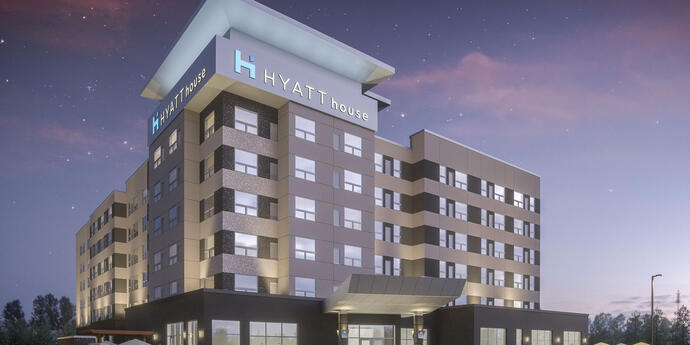
Temporary stay…lasting impact.
This six-storey hotel located in downtown Winnipeg includes 135 suites and 80 apartment-style suites with fully-equipped kitchens. The hotel also features a 24/7 market and gym, meeting rooms, an indoor pool, and dining areas.
Footprint was engaged to provide energy modelling and commissioning services on the project.
Following the path.
Footprint evaluated the energy performance of the hotel relative to the Manitoba Energy Code for Buildings (MECB) 2013 Performance Path. The Building commissioning formalized the review and integration of all project expectations through functional performance testing. Our team also verified operator training and systems manuals, and assessed documentation to establish that all of the building’s systems meet the criteria and objectives set forth in the owner’s project requirements.
Due to our systematic, methodical commissioning process, the project saw improved coordination between design, construction, and operations. Increased efficiency from equipment operations also resulted from the commissioning process, as well as enhanced indoor air quality and improved occupant comfort for guests and productivity for workers. Operations and maintenance costs were reduced, and the commissioning process led has set up the development well for longer lifespan of equipment.
Rendering courtesy of Hyatt Hotels Corporation
Temporary stay…lasting impact.
This six-storey hotel located in downtown Winnipeg includes 135 suites and 80 apartment-style suites with fully-equipped kitchens. The hotel also features a 24/7 market and gym, meeting rooms, an indoor pool, and dining areas.
Footprint was engaged to provide energy modelling and commissioning services on the project.
Following the path.
Footprint evaluated the energy performance of the hotel relative to the Manitoba Energy Code for Buildings (MECB) 2013 Performance Path. The Building commissioning formalized the review and integration of all project expectations through functional performance testing. Our team also verified operator training and systems manuals, and assessed documentation to establish that all of the building’s systems meet the criteria and objectives set forth in the owner’s project requirements.
Due to our systematic, methodical commissioning process, the project saw improved coordination between design, construction, and operations. Increased efficiency from equipment operations also resulted from the commissioning process, as well as enhanced indoor air quality and improved occupant comfort for guests and productivity for workers. Operations and maintenance costs were reduced, and the commissioning process led has set up the development well for longer lifespan of equipment.
